As a result of a political deadlock stemming from the June 2015 parliamentary elections in Turkey, President Recep Tayyip Erdogan has called a snap election, set for November 1, 2015. Even before the current political stalemate, Turks were split on whether the democratic system in their country was working, and positive views of Erdogan were at their lowest point since 2012. However, a majority of Turks still prefer a democratic form of government rather than a leader with a strong hand to guide their country.
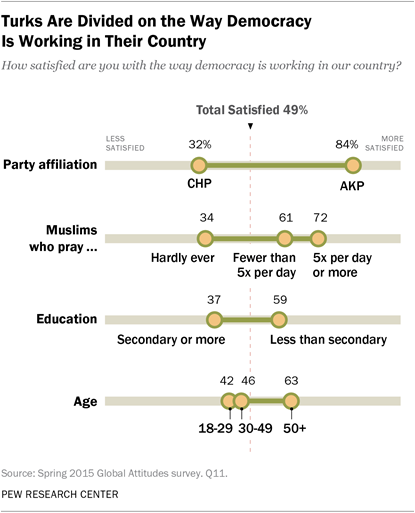
In addition to their mixed views on democracy, many Turks are dissatisfied with the direction of their country. Turks name rising prices, crime and inequality as the problems they worry about most. And as far as trust in national institutions, the military is the only one that Turks say has a good influence on the country. Views of the police, national government, religious leaders and the courts are mixed, while views of the media tilt to the negative. Additionally, 52% of Turks think their children will be worse off financially in the future.
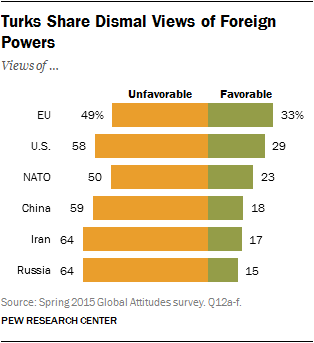
These are among the main findings of a recent Pew Research Center survey conducted April 5 to May 15, 2015 among 947 respondents in Turkey. The survey was conducted via face-to-face interviews before the June parliamentary elections and ensuing political stalemate, as well as before the recent escalation in military operations on the border against both Islamic State and Kurdish PKK militants, and the suicide bombing in Ankara just this past week.
Low Ratings for National Conditions in Turkey
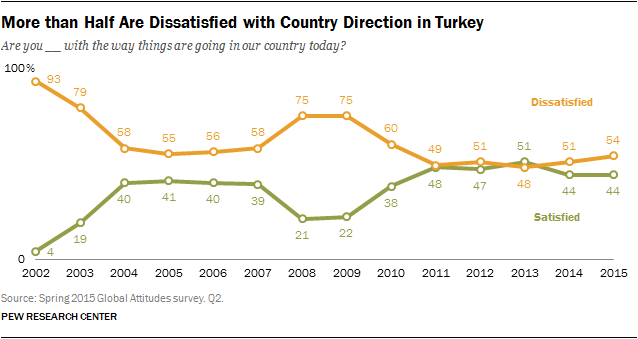
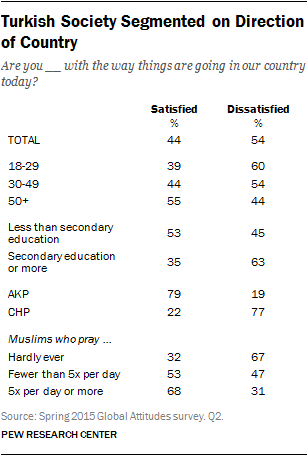
There are also divisions on country direction by age, education level and devoutness. Older and more educated Turks, as well as Turkish Muslims who pray 5 times per day or more, are happier with the direction of their country than younger, less educated and less devout Turks.
Generally, most Turks agree that children will be worse off than their parents financially when they grow up (52%), versus the 40% who say children will be better off. And in contrast to most other countries surveyed, the young are less hopeful about their future. Only 34% of 18 to 29 year-olds in Turkey say the next generation will be in a better position financially compared with 56% of those Turks ages 50 and older.

Inflation, Crime and Inequality Are Top Problems in Turkey
There are lower levels of concern over corruption among political leaders, poor-quality schools, traffic and health care. But overall, most Turks still see these issues as at least moderately big problems.
Turks with less education (less than secondary education equivalent) are more concerned about each of the 8 problems tested compared with their more educated (secondary education or more) counterparts. And generally, older Turks (50+ years-old) are more concerned about each of these issues compared with the country’s youth (18 to 29 year-olds).

Erdogan Favorability Falling
Erdogan’s supporters include AKP followers (87% favorable), Turks ages 50 and older (54%), lower educated Turks (53%) and Muslim Turks who pray 5 times per day or more (71%).
Military Is Only National Institution with Positive Rating in Turkey
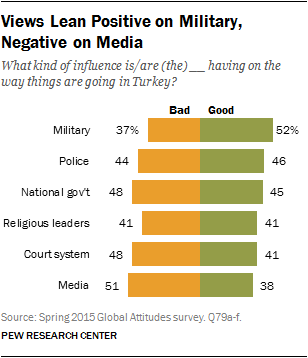
Turks are divided on many of the other major institutions in their country. Nearly equal numbers say that the police, national government and religious leaders are either a good or bad influence. About four-in-ten (41%) say that the court system has a good effect on the nation, but 48% rate its influence as bad.
More Turks say that the media, such as television, radio, newspapers or magazines, is a negative influence. About half (51%) say this, while 38% believe the media is a good influence.
Older Turks, those with less education, those who associate with the AKP and Muslims who pray more often are more likely to hold positive views of every institution listed. In other words, those who are more likely to be a part of Erdogan’s coalition are also more likely to say that these national institutions have a good influence on Turkey.
Most Prefer Democracy, but Divisions over How It Is Working
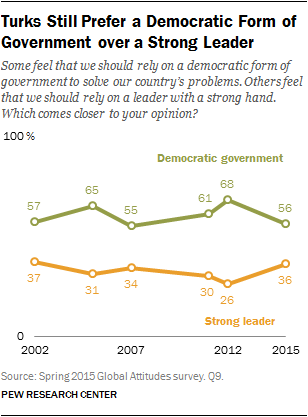
Turkish Muslims who hardly ever pray are much more likely to prefer a democratic form of government (78%) compared with those who pray five times per day or more (44%).
Additionally, a solid majority (61%) of AKP sympathizers support a strong leader versus a democratic form of government (36%). CHP supporters have almost exactly the opposite opinion; 68% prefer democracy, while 27% prefer a strong leader.
The country is evenly divided on how the current democratic system is working in Turkey. Roughly half (49%) are satisfied with the way democracy is working, with an equal 49% saying they are dissatisfied. But almost twice as many people are not at all satisfied with the current state of Turkish democracy (27%) compared with the 14% who are very satisfied.
As with many other aspects of Turkish public opinion, there is a clear divide on this issue among different demographic groups. Older Turks, those with less education and those who support the AKP are more likely to be satisfied with the current state of democracy. Additionally, among Turkish Muslims, 72% of those who pray five times per day or more are happy with the current state of Turkish democracy, compared to 34% among those who hardly ever pray.

Most Turks Think They Deserve More Respect Globally
Supporter of Erdogan’s AKP party are much more likely to say that Turkey is as respected around the world as it should be (53%) compared with followers of the opposition CHP (25%).
Majority of Turks Still Want to Join EU
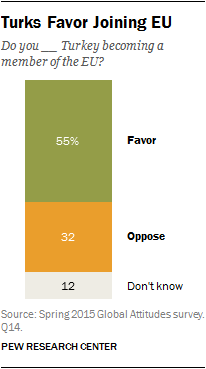
Meanwhile, sentiment towards other world powers is especially negative among Turks. Only 29% have a favorable view of the U.S. and just 23% have a positive opinion of NATO. Faring even worse are China (18% favorable), Iran (17%) and Russia (15%).
Turks Reluctant to Use Force to Defend NATO Allies
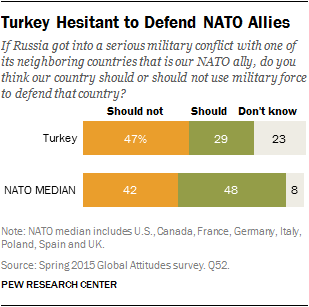
On the other side, only 29% of Turks say they should use force to defend their ally, with around a quarter undecided (23%). Because of the relatively high number of undecided people in Turkey on this question, the percentage saying that they should defend a NATO ally is much lower than the 8 country NATO median (48%).
Turks are split on whether the U.S. would come to that NATO country’s aid. Four-in-ten in Turkey say that the U.S. would use military force to defend their NATO ally, while 34% say the U.S. would not and a quarter are undecided. (For more on NATO countries’ views toward Russia and using military force to defend a NATO ally, see NATO Publics Blame Russia for Ukrainian Crisis, but Reluctant to Provide Military Aid, released June 10, 2015).
Turks Overwhelmingly Agree on Fewer Refugees from Syria and Iraq
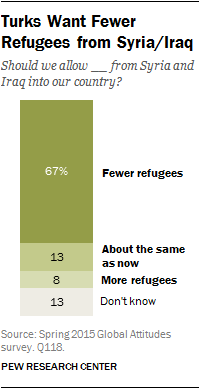
With refugees continuing to stream into Europe, Turks are insistent that fewer of them should be crossing their borders. Two-thirds say that Turkey should allow fewer refugees from Syria and Iraq into their country. Only 8% are willing to accept more refugees, while 13% would like to keep the flow about the same as it is now.
Among Muslims, those who are less devout are much more likely to want fewer refugees into the country (82%) compared with the most devout Turkish Muslims (59%). Still, all segments of Turkish society say that Turkey should allow fewer refugees into their southern borders.
Meanwhile, in the fight against ISIS, only 36% of Turks wanted to join the anti-Islamic State international coalition led by the U.S. when this survey was fielded. More (44%) thought they should not join the coalition, although many (20%) did not offer an opinion. However, at the time, 48% supported the U.S. military actions against ISIS in Syria and Iraq, with only 30% opposed.




